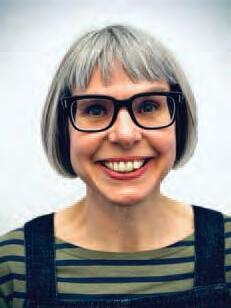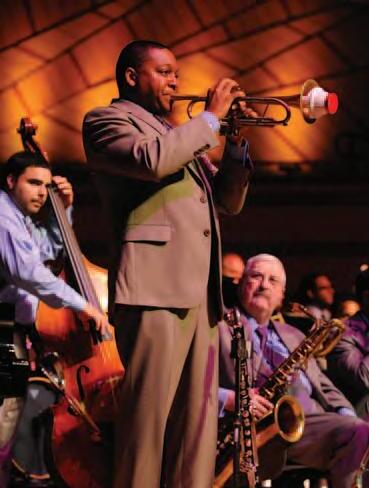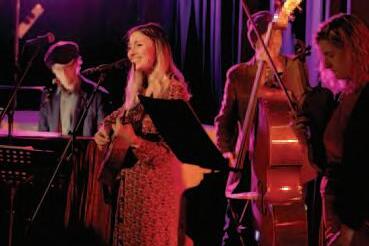
4 minute read
THE BOOKSHELF
Do women who write non-fiction get the attention they deserve? Book Festival Director Vicky Dawson looks at the calibre of female writers attending this year’s Festival and finds BIF to be ahead of the game.

book and as always Polly examines meritocracy in the UK alongside searing honesty about the privileges of her own background.
Gaia Vince was the first female outright winner of the Royal Society Science Prize for Adventures in the Anthropocene in 2015. Another “good grief” exclamation is coming...that prize was 28 years old at the time! The book became a deserved best seller and Gaia follows it up with Nomad Century: How to Survive the Climate Upheaval. Described as a rousing call to arms and striking an unusually optimistic note, Gaia’s book, offers solutions to the climate displacement that is already underway.
only articulate at funerals despite living effortlessly by its tenets.
It has recently been announced that the Woman’s Prize will launch an annual award for women’s non-fiction writing. ‘Research carried out by the trust found that 26.5% of non-fiction reviews in national newspapers was allocated to books by female writers, while 35.5% of books awarded a non-fiction prize over the past 10 years were written by a female writer, across seven UK non-fiction prizes,’ reported The Guardian.
As a programmer of a non-fiction festival this was of no surprise to me. The broadsheet buzz around female new non-fiction writing can be curiously understated; yet when the female author discusses her work on the Buxton stage, our audience are of course wowed. Somehow this disconnect doesn’t happen to our nonfiction writing chaps.
In another recent Guardian piece, it was reported that just 2% of GCSE candidates studied a book by a female author. Good grief! Really? Perhaps it is time for exam boards to read Claire Harman’s new book All Sorts of
Lives: Katherine Mansfield and the Art of Risking Everything. Virginia Woolf considered Mansfield an author she felt jealous of, and Claire Harman’s book suggests she is relevant, timely and certainly in need of reassessment.
With these two pieces of research in mind, I thought I should present a snapshot of the amazing female writing which makes up BIF 2023.
Leah Broad is garnering rave reviews for her book Quartet: How Four Women changed the Musical World. One of her four protagonists, Ethel Smythe, we have already celebrated at BIF in 2021 with a musical salon featuring her Suffragette anthem The March of the Women Leah Broad also rejuvenates the reputations of Dorothy Howell, Doreen Carwithen and Rebecca Clarke.
Polly Toynbee’s memoir An Uneasy Inheritance may come as a surprise to some. That she was the daughter and grand-daughter of intellectual Toynbee men, may have been obvious. Polly’s amazing, strong, often ghastly, sometimes delightful, and certainly aristocratic female forebears are more of a revelation. I’ve already devoured a very early proof copy of the
Sarah Bakewell is a philosopher who writes with clarity and accessibility. Her books How to Live: A Life of Montaigne and At the Existentialist Café: Freedom Being and Apricot Cocktails would certainly be on my list of favourite nonfiction and were awarded the WindhamCampbell Literary Prize…but in the US Sarah’s new book Humanly Possible: Seven Hundred Years of Humanist Freethinking, Inquiry and Hope looks at the belief system that you may
It would be remiss of me not to mention the notable female author at the heart of the BIF programme this year, Vera Brittain. We celebrate her life in our musical The Land of Might-Have-Been precisely because our, albeit unscientific and anecdotal, evidence is that Vera is not studied in school, not considered as a woman of Buxton, and not widely read. The exception being our own erudite and literary audience. It was a great privilege to hear a very early version of Michael William’s assured and fearless libretto, and with the interpretation of our splendid director Kimberley Sykes, BIF can give voice to Vera once again.
It is not possible to mention all of our amazing BIF women across our triptych of opera, music and books but we look forward to showcasing their astonishing dedication, contribution and talents this July.
VICKY DAWSON BIF Book Director
DON’T FORGET TO BOOK YOUR BIF PROGRAMME BOOK
Highlights of the 2023 Programme book will include:
• David Chandler on Ivor Novello: The Man with the Common Touch
• John Allison on La Sonnambula: A Soundworld of Special Purity
• Susanna MacRae and Olivia Doutney on What is Baroque Gesture?
• Iain Farrington on the reorchestration of Ivor Novello’s music
• Hannah Wolfe on her set and costume designs for Il re Pastore
• Wyn Davies writes a tribute in memory of Kit Hesketh-Harvey
Pre-ordered programme books are available at £12 each, while there will also be copies for sale during the festival at £15.
Visit the box office, www.buxtonoperahouse.org.uk
JAZZ IS BACK!
Neil Hughes, BIF’s Jazz Director, introduces this year’s Jazz Line-up Jazz is back in '23 with another fast start at The Palace Hotel. Opening up with New Orleans maestro Dale Storr on Thursday 6 July, we roll through 12 events all the way to Wynton Marsalis on Monday night at the Opera House.

Jazz is such a broad church, and once again we mix solo gigs, Jamie Safir on Friday night, duet gigs, Trish Clowes and Ross Stanley on Saturday night, and an 18-piece big band with the Northern Jazz Orchestra on Sunday lunchtime. Please take a look at the programme, it was so much fun putting it together.
New for 2023, our inaugural Late Night Jazz Cafe in Pavilion Gardens

We have three brand-new late-night shows for you, and if you are attending the musical or opera, you can now join us for food and drink afterwards, from 10pm. With three great bands booked, it is just like a gig downstairs, but book a platter at pavilion.gardens@parkwoodleisure.co.uk, and you can have VIP access upstairs on the mezzanine with table service for your group.








